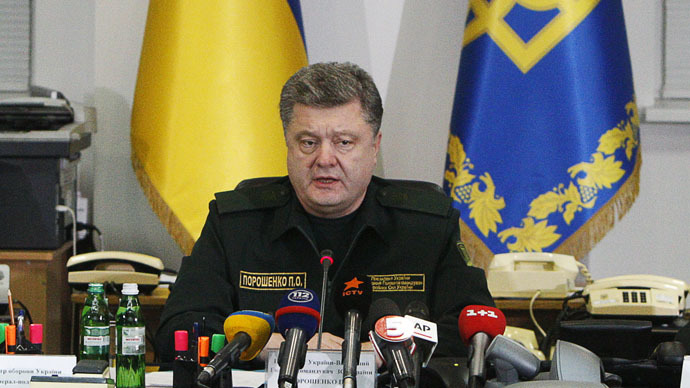‘Stick to Minsk deal’: Russia slams Ukraine idea for EU peacekeepers

Moscow criticized Kiev's plan to invite an EU police force under the EU’s aegis for a peacekeeping mission in war-torn eastern Ukraine, saying the move would undermine the Minsk ceasefire agreement.
Ukraine’s Security and Defense Council said it will call on the UN and EU to deploy a peacekeeping mission as requested by President Petro Poroshenko. Moscow believes Kiev is trying to sideline the OSCE mission, which was tasked with monitoring the implementation of the Minsk ceasefire agreement.
“I think it’s a little bit disturbing, because they just signed the Minsk agreements on February 12. And the Minsk agreements provide for the role of the OSCE, There is nothing about the UN or European Union,” Russia’s ambassador to the UN, Vitaly Churkin, told RT
“So for them to start talking immediately about something else… I think instead of coming up with new ideas they should really work harder on implementing what they agreed on,” Churkin told RT.
On Thursday, the EU said it was waiting for Kiev to provide concrete terms of the proposed peacekeeping mandate before making further comments.
Poroshenko’s announcement of an EU policing mission comes as a surprise, after a major stumbling block that stood in the way of the implementation of Minsk peace agreements – the encirclement of Ukrainian forces in Debaltsevo, which Kiev denied – was partially resolved. Earlier on Wednesday Poroshenko confirmed in a video statement that troops have been withdrawing from Debaltsevo.
Fight for border control
Poroshenko asked his security body to call in European peacekeepers on Wednesday, saying that an “EU police mission” would be the best format for an international presence in Ukraine.
“The best format for us is a policing mission from the European Union. We are convinced that this will be the most effective and optimal solution in a situation when promises of peace have not been kept,” said Poroshenko.
The council's head Aleksandr Turchinov said the peacekeepers should be stationed not only along the disengagement line separating Kiev's troops and the anti-government forces, but also along the part of the Russian-Ukrainian border, which is now controlled by the self-proclaimed republics. Such deployment will help “observe, and most importantly, to localize the violations, and provide real steps for the peaceful settlement of the conflict in Ukraine,” he said.
The Minsk agreement was negotiated in the Belarusian capital last week by the leaders of France, Germany, Russia and Ukraine and endorsed on Tuesday by a UN Security Council resolution. It states that Kiev would gain control over the border between Russia and its dissenting regions only after implementing far-reaching constitutional reform and giving wide autonomy to those regions.
The rebels called Kiev's proposal to place peacekeepers along the border “premature,” saying that OSCE monitors are already there. Russia invited observers to its border checkpoints in response to numerous accusations from Ukraine and its foreign sponsors of sending regular troops and weapons to the rebels.
Ceasefire holding despite Debaltsevo retreat
Despite sporadic flares of confrontation and the fight for Debaltsevo, the international community mostly agrees that the Ukrainian ceasefire is holding. According to the 13-point Minsk plan, a ceasefire went into effect on Saturday, and heavy weapons withdrawal is scheduled to be completed before March 1.
The OSCE, which is monitoring the ceasefire, confirmed the pullback of heavy weapons from the disengagement line by Lugansk militia, the Russian Ambassador to the OSCE, Andrey Kelin, told TASS.
READ MORE: Putin: West already supplies arms to Kiev, but Moscow optimistic about Minsk deal
“The OSCE is receiving reports on an ongoing pullback of armaments by the [self-proclaimed] Lugansk republic,” he said, adding that in Donetsk the organization placed about 20 patrol teams along the front line.
Speaking at a news conference on Wednesday, Russian Foreign Minister Sergey Lavrov said the ceasefire in Ukraine is “being observed along practically the entire frontline and in a few regions there is a readiness – at least the militia announced it publicly – to withdraw heavy weapons.”
At the same time, Lavrov noted that the US might still try to use the Debaltsevo events as a pretext for further anti-Russia moves, as its latest rhetoric corresponds with Washington’s “unconstructive” line on Ukraine.
Washington admitted the ceasefire in Ukraine is holding, with US State Department spokeswoman Jen Psaki saying on Wednesday that the State Department doesn’t consider it to be “dead.”
Citing OSCE reports, Psaki admitted clashes are continuing but the “quantity and intensity has decreased,” and both sides have withdrawn heavy weapons in certain areas as outlined by the Minsk peace plan. “We remain focused on supporting the implementation of this agreement,” she said.
The Obama administration is still deciding whether to provide “defensive lethal weapons” to Kiev, according to White House spokesman Josh Earnest. He said that both the rebels and Moscow have failed to comply with the ceasefire terms and “their failure to do so does put them at risk of greater costs.”












